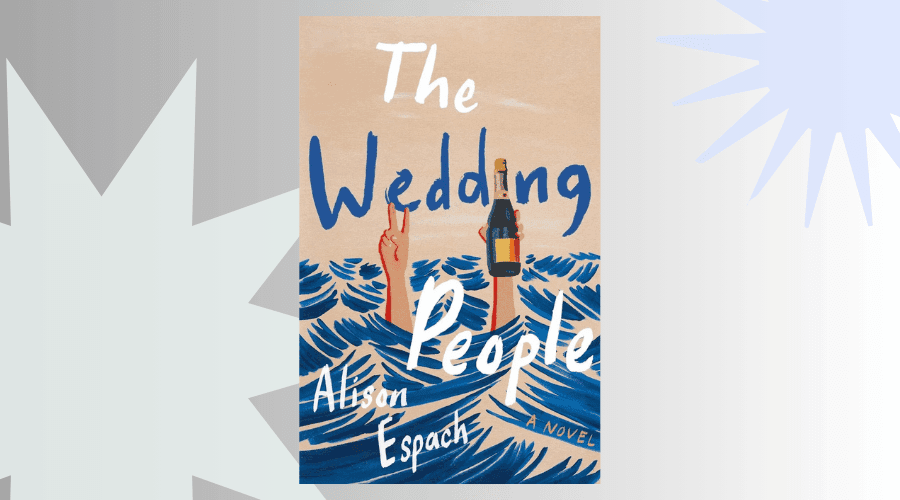Alison Espach’s The Wedding People is more than a story about a hotel wedding gone sideways—it’s a sharp, funny, and deeply moving novel about depression, reinvention, and the power of unexpected connection. At the center is Phoebe Stone, a divorced professor who arrives at the glamorous Cornwall Inn with no intention of leaving alive. Instead, she’s swept into the orbit of a bride, a wedding party, and a weekend that changes everything.
This guide brings together thoughtful book club questions on themes, characters, and big philosophical ideas. Whether your group loves to unpack emotional journeys, debate the meaning of happy endings, or just dive into messy, complicated characters, this novel offers plenty to talk about.
The Wedding People Book Club Questions
The Wedding People is the kind of novel that stirs both laughter and heartbreak, making it a rich choice for book club conversation. To help guide your discussion, we’ve organized questions into phases—starting with light first impressions and moving toward deeper reflections on characters, themes, and philosophy. This way, your group can ease in, dive deeper as the conversation unfolds, and finish by connecting the novel’s insights to your own lives.
Phase 1: Warm-Up & First Impressions
- What were your first impressions of Phoebe as a protagonist? Did you sympathize with her right away, or did it take time?
- The novel opens with Phoebe at her lowest point. Did that dark starting place make you hesitant, or did it immediately draw you in?
- How did the blend of humor and despair affect your reading experience?
- Did the hotel setting feel realistic or symbolic to you? What did it evoke as a stage for the story?
- What expectations did you have going into the novel, and were they fulfilled or challenged?
Pro Tip: Start here to ease everyone in. Invite members to share gut reactions before diving into heavier themes.
Phase 2: Characters & Relationships
- Do you think Phoebe truly intended to end her life, or was she unconsciously searching for something to hold onto?
- How would you describe the dynamic between Phoebe and Lila? Why do you think their bond formed so quickly and intensely?
- Lila is portrayed as beautiful and privileged, yet vulnerable. Did you find her believable?
- How do the wedding guests and hotel staff influence the story? Do they provide contrast, commentary, or just background noise?
- Phoebe’s ex-husband is not physically present but lingers in her story. How does his absence shape her choices and identity?
- Which secondary character stood out most to you, and why?
Pro Tip: Encourage members to consider whether they saw themselves in any of the characters. This makes the discussion more personal.
Phase 3: Themes & Symbols
- Weddings are supposed to be “perfect days.” How does the novel dismantle that cultural expectation?
- How does the story explore infertility, motherhood, and the idea of what makes a woman’s life “complete”?
- The Cornwall Inn almost feels like its own character. What role does the setting play in the narrative?
- In what ways does the novel highlight the gap between appearances and private realities?
- How does the story balance despair with humor? Does it succeed in showing that these emotions can coexist?
- Did you notice any recurring symbols or motifs in the novel? What did they represent for you?
Pro Tip: Point out that many readers see the setting (Cornwall Inn, the ocean) as a character in itself—ask whether your group agrees.
Phase 4: Deeper, Philosophical Questions
- What does the novel suggest makes life meaningful—love, friendship, chance, or self-reinvention?
- To what extent do you think chance encounters (like Phoebe meeting Lila) change the course of a life?
- Is despair ever fully erased, or does it always exist alongside joy?
- Weddings, like funerals, are rituals meant to create order out of chaos. Do you think such rituals bring real meaning, or only the illusion of it?
- Phoebe and Lila are both hiding pain. Is there a moral responsibility to be honest about suffering, or is concealment sometimes necessary?
- Can humor in the face of despair be as profound as grief?
Pro Tip: If the group gets stuck, ask members to share personal experiences with chance encounters that shifted their lives.
Phase 5: Wrap-Up & Personal Reflection
- Which character’s journey resonated with you the most, and why?
- Did the novel change how you think about weddings, rituals, or social performances?
- How did reading this book affect your perspective on friendship and unexpected human connections?
- If you could ask Phoebe one question at the end of the story, what would it be?
- The book is being adapted for film. What tone and style would you want the adaptation to take?
- Do you find the novel ultimately hopeful, cynical, or somewhere in between?
Pro Tip: End by asking each member to share one “takeaway” from the book—something they’ll keep thinking about.
The Wedding People Discussion Guide
Running a book club around Alison Espach’s The Wedding People can be both rewarding and delicate. The novel mixes dark themes like depression and infertility with sharp humor and unexpected friendship, which means discussions can swing between heavy and light. To help your group navigate this balance, here are some tips to create space for honest conversation, thoughtful reflection, and even laughter—while making sure everyone feels comfortable and included.
- Set the Tone Early: Let members know the novel contains heavy themes (suicide, depression, infertility) but also sharp humor. This helps everyone prepare emotionally and keeps the conversation balanced.
- Start Light, Go Deeper: Begin with first impressions or favorite lines before diving into heavier topics. It gives everyone a chance to warm up and feel comfortable.
- Acknowledge Trigger Topics: Remind the group it’s okay to step back from sensitive themes if anyone feels uncomfortable. Offer an alternative path, like focusing on the humor, the hotel setting, or the characters’ relationships.
- Encourage Mixed Reactions: This book often sparks both laughter and discomfort. Invite people to share where they found humor healing or unsettling—it leads to lively, nuanced debate.
- Use the Characters as Entry Points: Phoebe, Lila, and even the background “wedding people” embody larger themes. Ask which characters felt real, symbolic, or surprising to draw out different perspectives.
- Connect Ritual to Real Life: Since weddings are a central metaphor, open a discussion on how rituals in real life—marriage, graduations, funerals—can hide or reveal private truths.
- Invite Personal Reflection: Encourage members to share moments where a chance encounter, like Phoebe’s with Lila, shifted their own lives. This makes the discussion intimate and meaningful.
- Balance Humor and Depth: If conversation gets too heavy, pivot to the lighter side: Which scene made you laugh most? If it feels too light, circle back to the deeper questions about despair, meaning, and reinvention.
- Think Beyond the Page: Talk about the upcoming film adaptation—who would you cast, and what tone should it have? This is a fun way to end on a creative note.
- End with a Takeaway: Have each member share one insight they’ll carry away from the book—about life, friendship, or themselves. It ensures the discussion closes with reflection and connection.
Final Thoughts
The Wedding People is a novel that lingers—it asks hard questions about despair, friendship, and what it really means to start over, while still managing to make us laugh. Whether your discussion leans into the humor, the heartbreak, or the unexpected bonds between characters, we hope this guide helps spark meaningful and memorable conversation.
Wishing you a thoughtful, engaging, and truly enjoyable book club meeting. May your discussion be as surprising and life-affirming as Phoebe’s time at the Cornwall Inn.

